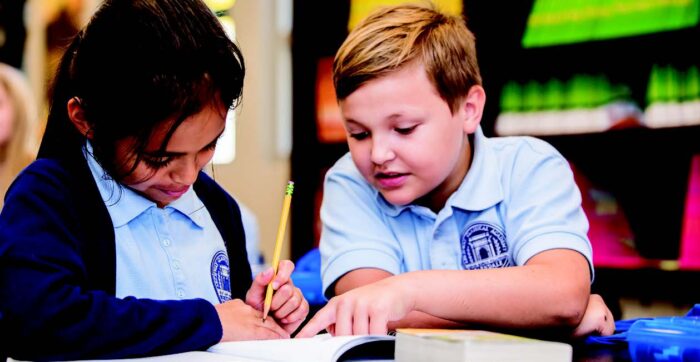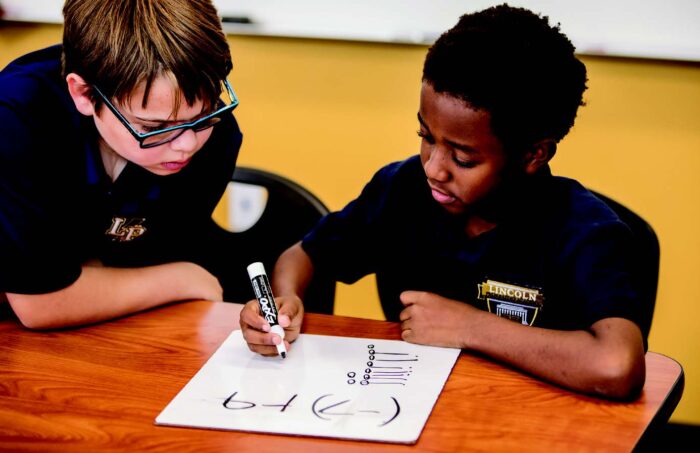Conversation in Mathematics
Great Hearts Academies October 13, 2023 -
By Melanie Brintnall and Mike Austin
Picture an orchestra. Violinists bow, trumpeters blow, and drummers thump, all contributing their knowledge and skill in accord with the conductor’s lead.
When a community of unique individuals shares their gifts under the leadership of a master, a greater good is accomplished than if each thought, practiced, and performed alone. This is the beauty of communal pursuit: the whole is greater than the sum of its parts.
This picture of harmonious musicianship is a far cry from most middle school math classes. The average American adult likely recalls spending class copying down problems from the board, memorizing steps, and replicating the process to answer homework and test questions correctly. Some may have briefly pondered, “How did mathematicians decide that this process of dividing fractions by multiplying by the reciprocal gets the right answer?” or even “What does it mean to divide 2/3 by 1/2?”, but likely did not pursue these questions further.
Every mathematical procedure we learned by rote was once a real discovery about the nature of number, shape, or pattern. For students to truly learn mathematics, they must grapple with puzzles and problems, make sense of the actual ideas at play, and refine their own mathematical process in light of these realizations. That is why the model lesson plan in a Great Hearts’ mathematics classroom begins with a motivating problem (for instance, “How many unique rectangles can be created from 12 squares? 16 squares? Other amounts of squares?”). Students often explore the task with a small group of peers, and while the teacher circulates and asks questions, he never gives the solution without the students striving to discover it themselves. At the end of this exploration, the teacher leads the full class in discussion to capture students’ findings and help hone their understanding for further practice.
This is the beauty of communal pursuit: the whole is greater than the sum of its parts.
By fully experiencing real problems, students find solutions meaningful and are motivated to engage actively in their learning. Collaboration is necessary because the opening problems are too difficult for students to solve on their own. Yet through conversation, each student’s partial insight contributes to an overall solution that was initially beyond the grasp of any individual student. As a result, students learn that using mathematical algorithms quickly and accurately is only a secondary mathematical skill; the primary skill is to discover algorithms and other mathematical facts.
This classroom, when excellently run, is like the orchestra we envisioned. The teacher’s job is not only to make sure each student learns but also to make sure all students help one another learn. As conductor, he knows how to coordinate these disparate voices so that the common conversation works together to form a harmonious whole. One student’s question allows another to ponder and chime in; an incorrect answer provides an opportunity for many minds to reconsider original knowns and unknowns and discuss a reasonable path forward. Mathematical knowledge comes about through dialogue as each member of the classroom contributes insights and questions. This is the common good of the classroom. To join a Great Hearts’ classroom is to choose to contribute to that common good—to benefit personally in knowledge and maturity, but also to be a benefit to others and to the class community.
Yet in this process, something more than mathematical knowledge comes about. Our mission is to cultivate minds and hearts together, which implies that the formation of the mind and heart are inextricably bound together toward an end that requires not only knowledge of Truth but the ability to “think deeply, lovenoble things, and live well together.” As Aristotle indicates in The Nicomachean Ethics, spending time together, sharing something in common, and finding joy in a common pursuit are marks of true friendship. We ask students to do difficult things, but they do them together, in a concert orchestrated by a teacher whose authority comes not simply from knowing the material but from knowing how to conduct the children in friendship to succeed in this difficult work.
Conversation is essential for this friendship to flourish. Even in mathematics.
Melanie Brintnall serves as Great Hearts’ Curriculum Manager for New Regions. Previously, she taught elementary and middle school Algebra for nearly a decade.
Michael Austin serves as Manager of Curricular Projects and previously served as High School Dean of Academics at Veritas Preparatory Academy in Phoenix, AZ, where he also taught Geometry and Humane Letters for over 12 years
Do you have a story or know of a story that you would like to see featured at Great Hearts? Please contact jason.moore@greathearts.org.

